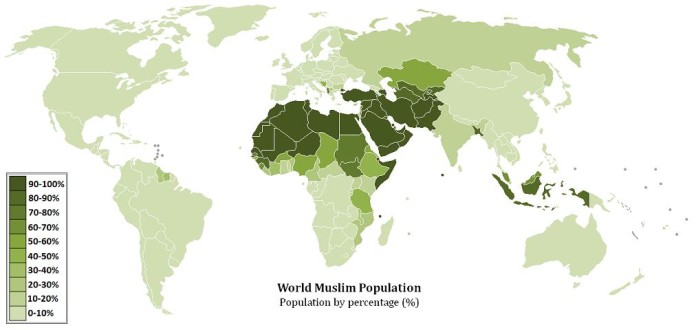In December Donald Trump called for the U.S. to ban all Muslim immigrants. The reactions his idea provoked are interesting.
For instance, former U.S. Vice President Dick Cheney said, “This whole notion that somehow we can just say, ‘No more Muslims,’ just ban a whole religion, goes against everything we stand for and believe in. I mean, religious freedom has been a very important part of our history and where we came from.”
Until now it had been hard for me to imagine a situation in which I’d say this, but I agree with Cheney.
GOP National Committee Chairman Reince Preibus said, “We need to aggressively take on radical Islamic terrorism but not at the expense of our American values.”
Speaker of the U.S. House of Representatives Paul Ryan was more explicit. “This is not conservatism,” Ryan said. “What was proposed yesterday is not what this party stands for, and more importantly, it’s not what this country stands for. Not only are there many Muslims serving in our armed forces and dying for this country, but there are Muslims serving right here in the House, working every day to uphold and defend the Constitution. Some of our best and biggest allies in this struggle and fight against radical Islamic terror are Muslims, the vast, vast, vast, vast majority of whom are peaceful and who believe in pluralism, freedom, democracy, individual rights.”
If you Google the word “jihad,” you might be surprised by what pops up in the top spot of your search: “Jihad is an Islamic term referring to the religious duty of Muslims to maintain the religion. In Arabic, the word ‘jihad’ is a noun meaning the act of ‘striving, applying oneself, struggling, persevering.’”
Surprised? It turns out jihad is an internal struggle to be better, to be a good person, to be a good Muslim. For Miriam Amer, executive director of the Iowa chapter of the Council on American-Islamic Relations, her jihad is raising her two children.
Yes, to mainstream Muslims it can also mean a just war—a military struggle against oppression—but not terrorism. When the word is used to describe terrorists, “it gives them a moral legitimacy they don’t deserve,” and equating “jihad” with the actions of terrorists “empowers who we want to marginalize and alienates who we want to win over.”
Those are the views expressed in “Inside Islam: What a Billion Muslims Really Think,” a documentary film screened Feb. 22 as part of “Who Speaks for Islam?” an Iowa State University event that also included a panel discussion sponsored by the Asian American Studies Program, the College of Liberal Arts and Sciences, the Philosophy and Religious Studies Department and Committee on Lectures.
The event began with “Inside Islam,” followed by a round table. Amer was joined on the panel by Sal Syed of the Islamic Center of Ames, Arnesa Buljusmic-Kustura, executive director of the Bosniak American Association of Iowa, State Rep. Ako Abdul-Samad, a Des Moines Democrat, and James Broucek, assistant professor of religious studies at ISU.
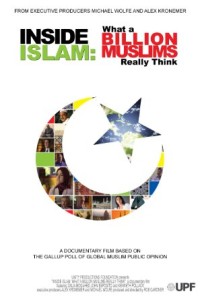 “Inside Islam” is based on an opinion poll conducted by Gallup. What a concept, removing the pundits, the media and the uninformed and directly interacting with the world’s Muslims. Over a period of six years, Gallup conducted tens of thousands of interviews with residents in 35 predominantly Muslim countries, along with smaller populations in Europe and the U.S.
“Inside Islam” is based on an opinion poll conducted by Gallup. What a concept, removing the pundits, the media and the uninformed and directly interacting with the world’s Muslims. Over a period of six years, Gallup conducted tens of thousands of interviews with residents in 35 predominantly Muslim countries, along with smaller populations in Europe and the U.S.
Both the film and the panelists advised against looking at Muslims and Islam through the lenses that Osama Bin Laden has placed upon our eyes but to be aware that media portrayals of Muslims focus on a fringe minority of militants who make up a tiny fraction of the Muslims in the world. If we lack a broader vision of Muslims in the world and a context within which to place news stories about Muslim terrorists, then we can develop a dangerously distorted and inaccurate vision.
In an effort to rid myself of at least part of my ignorance about Islam, I watched the film, listened to the panelists and left with every brochure that was made available to me. I now have a basic understanding that I’m almost embarrassed to admit is new to me.
My apologies in advance to Muslims and those knowledgeable of Islam. I wish I could hope for equal ignorance of my religion on the part of Muslims but since Islam acknowledges Jesus as a prophet, it could be the case that Muslims know more than I do about both Islam and Christianity.
There are 1.4 billion Muslims in the world. Approximately 15 percent are Arabs, but not all Arabs are Muslims. The largest percentage of Muslims live in Asia. And it’s no surprise that the vast majority of Muslims condemn the violent few, oftentimes in the name of their faith. Therefore, while terrorists believe in their own skewed interpretation, it is not ordained by Islam.
I’ll admit that I’ve wondered, “Why don’t the peaceful majority of true Muslims speak up for their religion and denounce the fringe terrorists?” But my perspective changed when one of the panelists noted that Christians are not expected to separate themselves from the KKK.
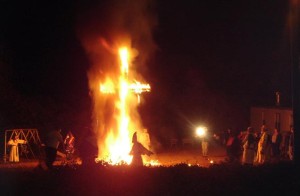
That’s true. I don’t feel the need to separate myself from the KKK. I don’t remotely feel that my Christianity has anything whatsoever to do with their hateful, non-Christian behavior, and yet I was expecting Muslims constantly to distance themselves from the terrorist fringe who call themselves Muslims but who have nothing to do with teachings of Islam.
As one of the brochures stated, “At the core of Islam is the focus of an individual’s personal relationship with God.” It said that “seeking lasting happiness through other means, such as following one’s desires or the accumulation of material possessions, will never fill the void we have. This need can only be filled with the awareness of God.”
It was pointed out that the primary victims of terrorist attacks are Muslims. While 7 percent of the Muslims surveyed by Gallop did say the 9/11 attacks were “completely justified” and had unfavorable views of the United States, not all of that 7 percent are active terrorists but are instead more of a cheering section. Gallup referred to this 7 percent as the “politically radicalized.” A fraction of 1 percent of the world’s Muslims–numbering in the 1,000s–are active terrorists.
A comparison was made to those who bomb U.S. healthcare clinics where abortions are performed. While a portion of the population does not support a woman’s right to choose, only a tiny fringe of this group would support bombing clinics.
Gallop found that the “cheering section” is no more religious than the mainstream Muslims. The difference between the terrorists and the mainstream is that the terrorists are more politically radical. They want political change quickly and via violence if necessary. They believe that both sacrificing their lives and attacking civilians are justified.
According to Gallup, members of the terrorist fring are better educated, do better job-wise, are more internationally aware and are more optimistic about their own individual futures—but not about society’s future, the region’s future, or the Muslim world’s future.
They have negative opinions about U.S. policies, tend to be from countries they feel are threatened by U.S. policies, believe that the U.S. meddles in and controls the internal politics of their countries and have negative opinions of their own governments. The anger against the U.S. is in part anger against their own regimes.
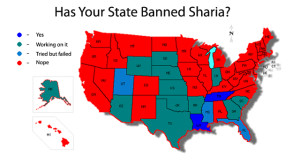
When it comes to Sharia law, I wasn’t scared of Sharia overtaking the U.S., as some of my fellow citizens appear to be. But I really had no understanding of what it truly is. According to the panelists, Sharia is a rule of law, a set of inalienable rights that people inherit from their creator, protections from God that governments cannot take away.
According to the film, god guarantees human dignity for each individual through these principles, and scholars then derive laws from these principles. Therefore, Sharia is a combination of the divine and human. It was compared to the Ten Commandments of Judaism, which Christianity inherited..
None of the panelists have experienced any conflicts between Sharia and the U.S. Constitution—both of which they follow and support. In fact, Sharia only applies to Muslims and not to non-Muslims. They agreed that there is nothing about Sharia that makes it impossible for Muslims to function in the U.S. or other democracies, such as India, which has the world’s second-largest population of Muslims.
One panelist commented that he felt that Sharia makes him a better citizen and member of society because, for example, following Sharia means that he doesn’t drink alcohol. However, he pointed out that it also does not mean that Muslims are trying to close every bar in the U.S.
Don’t many of our religions have rules that followers adhere to but that in no way conflict with our Constitution? And aren’t there Americans who believe that the Bible should be a source of legislation?
Unlike the Ten Commandments, Sharia as described by the panel is not a set standard of rules that can be printed and distributed to all Muslims around the world. It is rather a set of norms that are continually debated in communities and always changing. In many countries, Sharia is being used to gain more rights for women.
The bottom line is that there’s nothing about Islam that makes it impossible for Muslims to function in a democratic society.
A theme repeated throughout the evening was that Islam is not monolithic. No doubt this is true of most religions—the beliefs and practices of their followers are not uniform.
I also learned that Muslims view Jesus as a prophet of god. “Muslims heart Jesus” is the subtitle of a pamphlet I picked up after the panel discussion. According to the information provided by the Islamic Center in Ames, the Quran states that “Jesus gave life to the dead, cured the leper and the blind– all by the will of god.” Similarly, “Islam teaches us to love and respect all the Prophets of God. Acknowledging Jesus as a Prophet of God and becoming a Muslim does not mean changing or losing your Christian identity.”
Islam “is the same message preached by Noah, Abraham, Moses, Jesus, and Muhammad,” the brochure said.
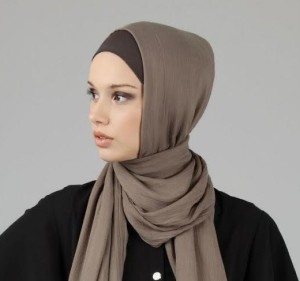
The female panelists also provided a broader perspective on choosing to wear a hijab, which is a veil that covers the head and chest and is particularly worn by some Muslim women beyond the age of puberty in the presence of adult males outside of their immediate family.
While the hijab is often depicted as a symbol of oppression, the female panelists spoke of wearing is as a way to be judged on who you are and not what you look like. It “takes the emphasis from the exterior to the interior,” one panelist said. It puts the focus on the mind, the intellect, the heart, a point reiterated in the film. Gallup found that among women who wear the hijab, the most predominant reason was that they believed it was a religious mandate.
Gallup also found the majorities of women in almost every country surveyed said women deserve the same legal rights as men and the opportunity to work at any job for which they are qualified and even to serve in the highest levels of government.
And as much as we Americans would like rose petals tossed into our paths when we land in other countries, the Gallop survey found that Muslims see a disconnect between our professed American values and how we treat Muslims. Muslims see us supporting autocrats and arming them but not promoting democracy in the Arab world and this frustrates both Arabs and Muslims—America says it wants people to have democratic ideas, and yet they view America as supporting regimes that suppress them.
The Gallop results showed a dramatic difference in how Canada and the U.S. are perceived by Muslims. Gallop attributes this vast difference to our policies. Some are viewed as discriminatory and racist, such as those favoring Israel, and as treating Muslims with what is perceived as disrespect.
There is a perception of U.S. arrogance—an attitude that “all these things have to change, and we’re going to change them for you,” with the U.S. implying that values, religion, how children are educated, how women are treated and so forth all must change.

There are many unfavorable views of the U.S. dues to the damage caused by the war in Iraq. For example, 67 percent of Kuwaitis hold unfavorable views of the U.S., while only 3 percent had unfavorable views of Canada.
Both those in the film and those on the panel asked us not to rely on the Bin Ladens of the world for our view of Islam and Muslims—not to let such people speak for Muslims. The U.S. was encouraged to engage the world based on facts instead of fear because when we don’t understand the world, we create strategies that actually make us less safe.
Our own Pentagon has made the same warnings that alienating Muslims will endanger national security.
President Obama made the same point after the terrorist attack in San Bernardino. “We cannot turn against one another by letting this fight be defined as a war between America and Islam,” he said. “Just as it is the responsibility of Muslims around the world to root out misguided ideas that lead to radicalization, it is the responsibility of all Americans—of every faith—to reject discrimination.”
The more one learns about even the basics of the Quran, Muhammad and Islam, the more impossible it becomes to blindly equate terrorist actions with Islam, just as it’s impossible to equate criminal actions by KKK members with Christianity.
I find it ironic that those who are oftentimes the victims of prejudice, intolerance and ignorance are bound by the tenets of their religion to condemn enmity, turn away from the ignorant, forgive and be kind.
It’s also disheartening that Muslims, as reported by Gallup, perceive a disconnect between our American values—the “beacon of democracy” we are perceived to be–and our treatment of Muslims.
I realize there is evil in the world. I realize it’s a serious issue demanding our attention. I realize many of the terrorists doing evil proclaim to be Muslims. But I also realize that these terrorists are not true followers of their faith. They do not represent or speak for the vast majority of peaceful, mainstream Muslims around the world, and they are killing non-Muslims and Muslims alike.
While there are no easy or quick solutions, it will most definitely take partnering with, versus alienating, the true followers of Islam and many other citizens of the world to effectively resolve these complex problems and ensure national and global security.
Seek to understand. Invite a Muslim to speak with your organization. Visit a mosque. Learn more. As Cheney said, we cannot “just ban a whole religion” because that “goes against everything we stand for and believe in.”



